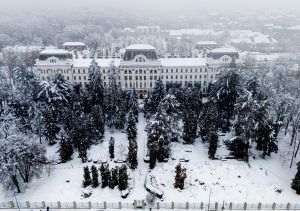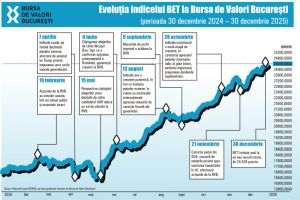The second half of 2024 represented a critical turning point for Romania's economy and political stability. In an attempt to counter the ever-expanding budget deficit and ensure macroeconomic balance, the government implemented a series of measures that, instead of stabilizing public finances, generated a climate of uncertainty and tension both economically and politically.
During the first three months of the second semester, there was an increase in the fiscal imbalance - an increase that will continue in the period October-December 2024 - through the uncontrolled increase in government spending and the Government's difficulty in collecting the revenues necessary to cover them, despite the generalization of the RO e-Invoice, RO e-Transport and RO e-TVA programs. Under these conditions, the deficit reached the alarming rate of 8.65% of GDP at the end of the second financial semester, i.e. 152.72 billion lei, an amount that made it impossible for the Government to comply with its commitments to the European Commission, but also to other international partners. The situation deteriorated rapidly, month by month, despite the measures taken by the Ciolacu Cabinet to attract new revenues to the public budget through numerous issues of government securities and bonds and by approving a tax amnesty aimed at stimulating revenues. The situation became especially dramatic because the Government increased the expenditures of the general consolidated budget by 19.1% in 2024 compared to the previous year, which led to total expenditures of 727.32 billion lei, most of the increase being destined for public sector salaries, pensions, social assistance and support for vulnerable categories. At the same time, interest expenses reached 36.28 billion lei, which put even more pressure on the state budget. Against this backdrop, the Fitch rating agency revised the BBB- rating given to our country (the last step before being thrown into the junk category) to a negative outlook on December 17, signaling major risks to fiscal sustainability and a decline in investor confidence, a revision that led to an increase in borrowing costs and a depreciation of the national currency.
In this entire negative financial-fiscal context, the National Bank of Romania operated in the second semester of last year two successive reductions in the monetary policy interest rate, which it set at 6.5%, trying to stimulate the economy and limit the effects of the recession that threatened the country.
Furthermore, in order to impose fiscal rigor on the domestic level, the Government obtained the agreement of the European Commission for a plan to recover the state budget over the next seven years, but the lack of coherence in the fiscal strategy and the increase in uncontrolled spending led to a negative reaction from both the business environment and international institutions.
The effects of economic imbalances were quickly translated into political terms, culminating in the controversial cancellation of the presidential elections in December, but also in the fact that following the parliamentary elections on December 1, the new Legislature is composed of three sovereignist, nationalist parties, which hold over a third of the 466 seats in parliament and senators. However, the pro-European coalition PSD-PNL-UDMR-National Minorities Group managed to impose its own Government on December 23, led by the same Marcel Ciolacu, as Prime Minister. The new Government, in the context of an unprecedented budget crisis, adopted new austerity measures at the end of last year through the so-called "Trenuleţ" Ordinance, which generated new social tensions and new protests at the national level.
It is certain that the second financial semester of last year highlighted the vulnerabilities of the Romanian economy and the inability of decision-makers to implement sustainable reforms, which led to a budget execution under pressure, a record deficit and a political scene in chaos.
• July - energy deficit, prices of 1000 euros/MWh
July brought severe challenges to Romania's energy sector, which had to deal with an extreme heat wave, which led to an increased demand for electricity. The heat wave was so severe that temperatures constantly exceeded 40 degrees Celsius in most counties, causing the population to continuously use air conditioners, including at night. This increased demand exerted immense pressure on the electrical networks, resulting in power outages in many localities in the country. To deal with the situation, Prime Minister Marcel Ciolacu convened an Energy Command, establishing a set of measures and emergency measures, including the temporary reopening of some coal-fired power plants. This was a controversial decision, given the transition to green energy, but it was considered necessary to ensure the stability of the energy system in the face of such high demand.
The problems in the energy sector have also highlighted the limits of the existing energy storage infrastructure. Although Romania has invested heavily in renewable energy projects, such as wind and photovoltaic parks, storage capacities have been insufficient. During the day, solar and wind energy was produced in excess and sold at low prices, but in the evening, when demand was highest due to tropical nights, Romania had to import energy at high prices. In some cases, the price of energy reached 900-1,000 euros per MWh, which put additional pressure on the economy and consumers.
In macroeconomic terms, July was marked by continued budget spending, with the Government approving new investments and support schemes, especially for farmers and producers in the agri-food industry. Although ANAF managed to exceed its collection targets for July, budget revenues were not sufficient to cover the expenses. Therefore, the Ministry of Finance was forced to issue new issues of government securities and Fidelis and Tezaur bonds, borrowing considerable amounts from the financial markets to cover the deficit. At the end of July, the Ministry of Finance announced that it had managed to attract 658 billion lei, money intended for refinancing public debt and covering the deficit.
In the context of decreasing inflation, the National Bank of Romania decided to reduce by 0.25 percentage points the monetary policy interest rate, the interest rate for the lending facility (Lombard) and the interest rate on the deposit facility. It was the first reduction approved by the NBR Board of Directors, from January 2023 to July 2024, a period in which the central bank maintained the same monetary policy interest rate, of 7% per year.
The only good news in July came on the sports front, with the success of Romanian athletes at the Paris Olympics. Swimmer David Popovici became Olympic champion in the 200-meter freestyle on July 29, on National Anthem Day, and two days later he won the bronze medal in the 100-meter freestyle. These successes brought a wave of optimism and national pride, in a difficult period from an economic point of view.
• August - first negotiations with the new European Commission
The last month of summer continued to be a difficult one for the Romanian economy, especially due to the increase in the budget deficit, in the light of the increase in public spending, which led the Government to try to manage the situation through negotiations with the European Commission. During a meeting he had in Brussels with Ursula von der Leyen, the President of the European Commission, Marcel Ciolacu requested for the first time the extension of the deficit margin for the coming years and proposed a seven-year plan that would allow Romania to return to a deficit of 3% of GDP.
The BNR reduced the monetary policy interest rate by 25 percentage points once again, in a last attempt last year to stimulate the economy, stabilizing this rate at 6.5% per year. This decision was well received by the financial markets and the rating agencies. Fitch has reaffirmed Romania's rating at BBB-, with a stable outlook, noting that the Romanian economy could grow by 2.5% in 2024.
However, the Government continued to allocate funds for various budgetary expenditures, supplementing the budget of the Ministry of Transport with 820 million lei from the Reserve Fund, that of the Ministry of Investments and European Projects with 575 million lei, and launching the Start-Up Nation Romania 2024 program, which has been allocated funding of over 446 million euros.
All these allocations did not take into account the budget deficit situation after the first seven months of last year, a deficit that at the end of July amounted to 71.04 billion lei, representing 4.02% of GDP, almost double the same period in 2023.
We also mention that, on the political front, in August Marcel Ciolacu was re-elected leader of the PSD and designated the party's candidate in last year's presidential elections.
• September - budget rectification with negative impact on the deficit
The first month of autumn was marked by the budget rectification adopted by the Government, which, although it was classified by Prime Minister Marcel Ciolacu as a positive one, in reality deepened the budget deficit, establishing that it was to reach 6.94% of GDP at the end of 2024. According to the budget rectification, the Gross Domestic Product was to be 1,768 billion lei, compared to 1,733 billion lei as provided for in the state budget law. Rectification budget provided for an increase of 8.8 billion lei in personnel expenses, 3 billion lei in interest expenses, 5.12 billion lei in social assistance expenses, but also a decrease of 1.8 billion lei in the amount allocated to investments.
Among the ministries that saw an increase in the budget for 2024 were:
- The Ministry of Energy received an additional allocation of 1.28 billion lei to support protection measures against the energy crisis and to finance green and sustainable energy projects.
- The Ministry of Health benefited from additional funds worth 3.89 billion lei to cover expenses related to the purchase of medicines, equipment and for the modernization of hospital infrastructure.
- The Ministry of Agriculture received 2 billion lei to compensate for the losses of farmers affected by drought and other unfavorable climatic phenomena.
- The Ministry of Transport received additional allocations of 5.48 billion lei for financing major infrastructure projects, especially for the construction of highways and the modernization of railways.
- The Ministry of Development, Public Works and Administration received another 9.7 billion lei to support the financing of public investments carried out through the national programs Anghel Saligny, PNDL 1 and 2, to which are added complementary programs with funding from the PNRR related to it: the Renovation Wave and urban mobility support programs.
- The Ministry of Investments and European Projects received an additional 3.3 billion lei for projects financed from the NEF (vouchers for disadvantaged people, educational support for the 2024-2025 school year, for disadvantaged children, first didactics, etc.).
After the budget rectification, in light of the need to increase state budget revenues, the Government approved a partial tax amnesty, which aimed at recovering approximately 9.5 billion lei in arrears of companies and individuals. The tax amnesty measure was to benefit 330,000 companies and 848,000 individuals, who had to pay by November 25, 2024 the arrears registered on August 31, 2024 regarding the main obligations to the state budget, in which case they would benefit from the cancellation of interests, penalties and other accessories.
Also in September, the NBR published data on the current account deficit, which reached 15.178 billion euros in the first seven months of the year, up 33.99% compared to the same period the previous year. This reflects an increase in imports, especially energy, and a decrease in exports, which contributed to the deepening of the trade imbalance.
• October: PSD-PNL coalition deepens deficit, in the midst of electoral campaign
The middle of the calendar autumn was dominated by the government's decision to allocate additional amounts from the Reserve Fund to various ministries, despite the fact that the budget deficit had already reached 5.44% of GDP, after the first three quarters of 2024. After the budget rectification it operated in early September, the government continued to increase public spending to meet the demands of the unions and to support various electoral projects. Notable allocations included: 5 billion lei for the Ministry of Transport - directed towards infrastructure projects, 1.1 billion lei for CNAS - necessary to support medical expenses, 800 million lei for the Ministry of Education, for school infrastructure projects, massive funding for the Anghel Saligny program and the payment of outstanding amounts on the Start-Up Nation program. These measures have been criticized by economic analysts for increasing the pressure on the state budget, while increasing public debt.
In this context, the Ministry of Finance has developed an ambitious seven-year fiscal adjustment plan, aimed at gradually reducing the budget deficit to 2.5% of GDP by 2031. This plan involves increasing budget revenues through tax reforms, including improving VAT collection and reducing tax evasion, and reducing public spending, especially personnel and social assistance.
To continue financing budget spending, the Government continued to borrow money on international markets, launching a 33 billion yen Samurai bond issue, aimed at raising 200 million euros. At the same time, domestic issues of Fidelis and Tezaur government securities raised over 3.5 billion lei, breaking previous records.
In this macro-financial context, the NBR Board of Directors maintained the monetary policy interest rate at 6.5%, and S&P reconfirmed Romania's country rating at BBB-/A3, emphasizing that economic stability depends on the implementation of structural reforms.
• November: presidential elections increase volatility in BVB
The organization of the presidential and parliamentary elections led to a significant increase in public spending, although the budget deficit at the end of the first ten months of last year had reached 6.19% of GDP. However, the PSD-PNL government continued to allocate significant amounts from the state budget for several infrastructure projects. Among the respective allocations, we mention the amount of 10.9 billion lei for the modernization of 143 kilometers of railway, the purchase of 23 modern electric locomotives for the amount of 760.3 million lei, the purchase of nine long-distance interregional electric trains for 447.4 million lei, but also the supplement of the budget of the Ministry of Transport with over 1.4 billion lei to support rail transport and other infrastructure projects. In the field of state aid, the Executive decided to grant 495.2 million lei as a grant to the company Nokian Tyres for a total investment of 3.116 billion lei in Oradea. The new factory will create over 550 jobs and will have a major economic impact at the local level.
Due to the lack of funds necessary to pay pensions following this year's recalculation, the Government supplemented, in November, the budget of the Ministry of Labor and Social Solidarity with 1.6 billion lei, money used for the full payment of pensions in December 2024. The Executive also allocated an additional approximately 1.6 billion lei to the same ministry for the payment of allowances, indemnities and social assistance, including for heating in the cold season.
Another measure taken by the Government in November was the increase in the gross minimum wage in the country, starting with January 1, 2025, from 3,700 lei to 4,050 lei, a measure that benefits over 1.8 million employees.
These allocations were criticized for their lack of sustainability and for the fact that they were electorally motivated.
In this context, the first round of the presidential elections held on 24 November was marked by major controversies, including accusations of external influence and the improper use of social media platforms to promote candidates. The result of the first round, dominated by candidate Călin Georgescu, generated significant volatility on the Bucharest Stock Exchange, amid concerns about the rise of extremism. Immediately after the first round of the presidential elections on 24 November, a real scandal erupted due to the fact that independent Călin Georgescu was heavily promoted on TikTok and Facebook, but did not declare any campaign expenses. Due to the existing suspicions that state (states hostile to Romania) and non-state financiers were behind him, President Klaus Iohannis decided, on 27 November, to convene the meeting of the Supreme Council for National Defense for the second day, in which the entire situation would be analyzed. Following the CSAT meeting on November 28, after analyzing the data provided by the Special Telecommunications Service, the Romanian Intelligence Service, the Foreign Intelligence Service and the Ministry of Internal Affairs, the members of this structure found that there were cyber attacks aimed at influencing the fairness of the electoral process in the presidential elections, from state actors (CSAT mentioned the Russian Federation as a priority) and non-state actors. The analysis of the documents revealed that, in violation of electoral legislation, a candidate in the presidential elections benefited from massive exposure due to the preferential treatment that the TikTok platform granted him by not marking him as a political candidate, respectively without requiring him to mark his video electoral materials with the unique identification code assigned by the Permanent Electoral Authority upon the appointment of the coordinating financial representative, an obligation imposed by electoral legislation. This preferential treatment was exacerbated by TikTok's failure to comply with the Central Electoral Bureau's Decision, which found that, in fact, the Chinese company, contrary to what was officially communicated to the Romanian authorities, did not implement the provisions of the BEC Decision in any respect. From this perspective, the CSAT took note of the fact that, certainly, the social network TikTok, by not implementing the BEC Decision, did not comply with the legal norms regulating the conduct of the electoral process, with an impact on its final result.
Therefore, the CSAT asked the authorities with responsibilities in the field of national security, those with responsibilities in the proper conduct of the electoral process, as well as the criminal investigation bodies to urgently take the necessary steps, according to their legal competences, to clarify the respective aspects.
• December: Ciolacu 2 Government imposes austerity in the budgetary system and reactivates the pillar tax
The last month of the second financial semester of last year began with the parliamentary elections on December 1, following which 34% of the new Parliament is made up of sovereignist, nationalist forces: AUR, SOS and POT. Even though the parliamentary elections were held under the same conditions as the presidential elections on November 24, on December 6 - while the Diaspora was voting in the second round of the presidential elections - the Constitutional Court decided to cancel the entire election for the supreme office in the state, based on documents presented by the secret services in the CSAT meeting on November 28, causing a wave of public and political discontent. The cancellation of the presidential elections meant that most of the 1.4 billion lei (i.e. around 300 million euros, compared to the 2019 presidential elections for which 150 million euros were allocated) allocated by the Government for this election was spent unnecessarily, as long as the electoral process was canceled. To this amount is added 109.59 million lei, the total amount spent by the candidates in the presidential elections according to AEP data, excluding the amounts undeclared by Călin Georgescu, but which, at first glance, would amount to millions of euros, amounts that the Authority must return from the state budget to the respective candidates.
In this context, the new Parliament - in which the pro-European coalition PSD-PNL-UDMR and the group of national minorities is in the majority - approved on December 23 the government led by the same Marcel Ciolacu, as Prime Minister. The new Government was also confronted with the negative outlook of the BBB- index granted by the Fitch agency to our country on December 17 regarding economic development, a perspective that mentions the risks associated with political instability and countless fiscal slippages last year. According to Fitch experts, the fiscal deterioration beyond expectations since the end of last year mainly reflects the rapid increase in spending, including public sector wages and unfunded pension increases before the elections.
In light of this forecast and in order to comply with the provisions of the 7-year fiscal recovery plan agreed with the European Commission, the Ciolacu 2 Government was forced on the penultimate day of the year to take drastic measures, which it approved through an emergency ordinance - the so-called trenulet ordinance.
These measures include:
-reducing the turnover threshold for taxation of micro-enterprises from 500,000 euros to 250,000 euros in 2025 and to 100,000 euros in 2026
- increasing the dividend tax from 8% to 10%
- eliminating tax facilities for IT, agriculture and construction
- reintroducing the tax for special constructions - the so-called pillar tax -, in the amount of 1%
- freezing the salaries of public sector employees and freezing pensions
- granting holiday vouchers on condition that the employee contributes half of their value
- reducing free transport for pupils and students; they will benefit from a reduction only for transportation between their place of residence and the one where they are studying
- overtaxation of energy companies
These measures were criticized by the business environment and unions, being perceived as a form of austerity that undermines economic competitiveness.
The fact is that at the end of the second financial semester, according to the budget execution published by the Ministry of Finance, the budget deficit reached 8.65% of GDP (152.72 billion lei), compared to the deficit of 90.06 billion lei, respectively 5.61% of GDP for 2023. According to the cited source, budget revenues amounted to 574.6 billion lei at the end of the second semester, while the expenditures of the general consolidated budget amounted to 727.32 billion lei (19.1% more compared to 2023). Of the total budget expenditures, personnel expenditures were 164.6 billion lei (up 24% compared to 2023), expenditures on goods and services were 93.66 billion lei (up 21.4% compared to 2023), interest expenditures were 36.28 billion lei (an increase of 6.37 billion lei compared to 2023), while social assistance expenditures amounted to 223.93 billion lei, up 17.2% compared to the previous year.
Subsidy expenditures were 17.1 billion lei, and the Ministry of Finance specified that this amount mainly represents subsidies for passenger transport, for supporting agricultural producers, as well as for the compensation scheme for the consumption of electricity and natural gas by non-household consumers (3.4 billion lei out of a total payment of almost 9 billion lei, which means that the difference will burden the 2025 budget).
The only positive thing regarding the budget execution at the end of the second financial semester is the 19.4% increase in investment expenditures (including capital expenditures), which in 2024 amounted to 120.21 billion lei, compared to 100.65 billion lei in the previous year.

















































